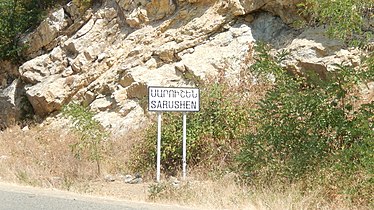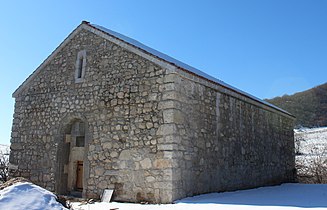Sarushen, Nagorno-Karabakh
Sarushen / Daghyurd
Սարուշեն / Dağyurd | |
|---|---|
 Pirumashen Church in Sarushen | |
| Coordinates: 39°43′20″N 46°54′20″E / 39.72222°N 46.90556°E | |
| Country | |
| • District | Khojaly |
| Elevation | 1,095 m (3,593 ft) |
| Population (2015)[1] | |
• Total | 378 |
| Time zone | UTC+4 (AZT) |
Sarushen (Armenian: Սարուշեն) or Daghyurd (Azerbaijani: Dağyurd) is a village in the Khojaly District of Azerbaijan, in the region of Nagorno-Karabakh. Until 2023 it was controlled by the breakaway Republic of Artsakh. The village had an ethnic Armenian-majority population[2] until the exodus of the Armenian population of Nagorno-Karabakh following the 2023 Azerbaijani offensive in Nagorno-Karabakh.[3]
History
[edit]During the Soviet period, the village was part of the Askeran District of the Nagorno-Karabakh Autonomous Oblast.
Historical heritage sites
[edit]Historical heritage sites in and around the village include a 12th/13th-century khachkar, the 17th-century church of Pirumashen (Armenian: Փիրումաշեն), restored in 2014 (possibly originating from as early as the 12th/13th century[4]), the 18th/19th-century village of Pirumashen (Փիրումաշեն), an 18th/19th-century cemetery, and the 19th-century church of Surb Amenaprkich (Armenian: Սուրբ Ամենափրկիչ, lit. 'Holy Savior').[1]
Economy and culture
[edit]The population is mainly engaged in agriculture and animal husbandry. As of 2015, the village has a municipal building, a house of culture, a secondary school, four shops, and a medical centre.[1]
Demographics
[edit]The village had 388 inhabitants in 2005,[5] and 378 inhabitants in 2015.[1]
Gallery
[edit]-
Sign in Armenian reading "Sarushen"
-
WWII monument
-
Pirumashen Church
References
[edit]- ^ a b c d Hakob Ghahramanyan. "Directory of socio-economic characteristics of NKR administrative-territorial units (2015)".
- ^ Андрей Зубов. "Андрей Зубов. Карабах: Мир и Война". drugoivzgliad.com.
- ^ Sauer, Pjotr (2 October 2023). "'It's a ghost town': UN arrives in Nagorno-Karabakh to find ethnic Armenians have fled". The Guardian. ISSN 0261-3077. Retrieved 9 November 2023.
- ^ "The Churches of Artsakh". St. Nersess Armenian Seminary.
- ^ "The Results of the 2005 Census of the Nagorno-Karabakh Republic" (PDF). National Statistic Service of the Republic of Artsakh.







